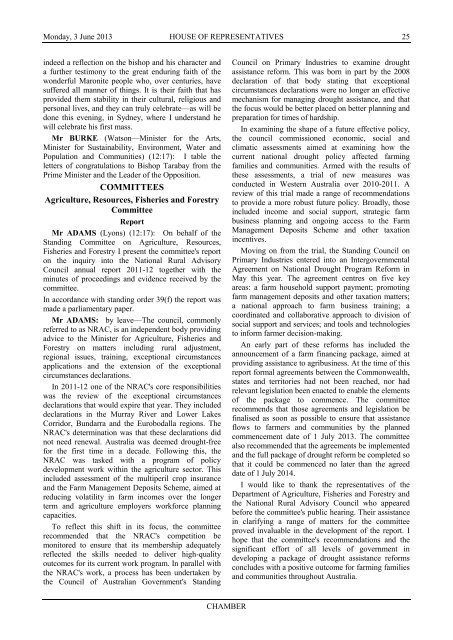House of Representatives
House of Representatives
House of Representatives
You also want an ePaper? Increase the reach of your titles
YUMPU automatically turns print PDFs into web optimized ePapers that Google loves.
Monday, 3 June 2013 HOUSE OF REPRESENTATIVES 25<br />
indeed a reflection on the bishop and his character and<br />
a further testimony to the great enduring faith <strong>of</strong> the<br />
wonderful Maronite people who, over centuries, have<br />
suffered all manner <strong>of</strong> things. It is their faith that has<br />
provided them stability in their cultural, religious and<br />
personal lives, and they can truly celebrate—as will be<br />
done this evening, in Sydney, where I understand he<br />
will celebrate his first mass.<br />
Mr BURKE (Watson—Minister for the Arts,<br />
Minister for Sustainability, Environment, Water and<br />
Population and Communities) (12:17): I table the<br />
letters <strong>of</strong> congratulations to Bishop Tarabay from the<br />
Prime Minister and the Leader <strong>of</strong> the Opposition.<br />
COMMITTEES<br />
Agriculture, Resources, Fisheries and Forestry<br />
Committee<br />
Report<br />
Mr ADAMS (Lyons) (12:17): On behalf <strong>of</strong> the<br />
Standing Committee on Agriculture, Resources,<br />
Fisheries and Forestry I present the committee's report<br />
on the inquiry into the National Rural Advisory<br />
Council annual report 2011-12 together with the<br />
minutes <strong>of</strong> proceedings and evidence received by the<br />
committee.<br />
In accordance with standing order 39(f) the report was<br />
made a parliamentary paper.<br />
Mr ADAMS: by leave—The council, commonly<br />
referred to as NRAC, is an independent body providing<br />
advice to the Minister for Agriculture, Fisheries and<br />
Forestry on matters including rural adjustment,<br />
regional issues, training, exceptional circumstances<br />
applications and the extension <strong>of</strong> the exceptional<br />
circumstances declarations.<br />
In 2011-12 one <strong>of</strong> the NRAC's core responsibilities<br />
was the review <strong>of</strong> the exceptional circumstances<br />
declarations that would expire that year. They included<br />
declarations in the Murray River and Lower Lakes<br />
Corridor, Bundarra and the Eurobodalla regions. The<br />
NRAC's determination was that these declarations did<br />
not need renewal. Australia was deemed drought-free<br />
for the first time in a decade. Following this, the<br />
NRAC was tasked with a program <strong>of</strong> policy<br />
development work within the agriculture sector. This<br />
included assessment <strong>of</strong> the multiperil crop insurance<br />
and the Farm Management Deposits Scheme, aimed at<br />
reducing volatility in farm incomes over the longer<br />
term and agriculture employers workforce planning<br />
capacities.<br />
To reflect this shift in its focus, the committee<br />
recommended that the NRAC's competition be<br />
monitored to ensure that its membership adequately<br />
reflected the skills needed to deliver high-quality<br />
outcomes for its current work program. In parallel with<br />
the NRAC's work, a process has been undertaken by<br />
the Council <strong>of</strong> Australian Government's Standing<br />
CHAMBER<br />
Council on Primary Industries to examine drought<br />
assistance reform. This was born in part by the 2008<br />
declaration <strong>of</strong> that body stating that exceptional<br />
circumstances declarations were no longer an effective<br />
mechanism for managing drought assistance, and that<br />
the focus would be better placed on better planning and<br />
preparation for times <strong>of</strong> hardship.<br />
In examining the shape <strong>of</strong> a future effective policy,<br />
the council commissioned economic, social and<br />
climatic assessments aimed at examining how the<br />
current national drought policy affected farming<br />
families and communities. Armed with the results <strong>of</strong><br />
these assessments, a trial <strong>of</strong> new measures was<br />
conducted in Western Australia over 2010-2011. A<br />
review <strong>of</strong> this trial made a range <strong>of</strong> recommendations<br />
to provide a more robust future policy. Broadly, those<br />
included income and social support, strategic farm<br />
business planning and ongoing access to the Farm<br />
Management Deposits Scheme and other taxation<br />
incentives.<br />
Moving on from the trial, the Standing Council on<br />
Primary Industries entered into an Intergovernmental<br />
Agreement on National Drought Program Reform in<br />
May this year. The agreement centres on five key<br />
areas: a farm household support payment; promoting<br />
farm management deposits and other taxation matters;<br />
a national approach to farm business training; a<br />
coordinated and collaborative approach to division <strong>of</strong><br />
social support and services; and tools and technologies<br />
to inform farmer decision-making.<br />
An early part <strong>of</strong> these reforms has included the<br />
announcement <strong>of</strong> a farm financing package, aimed at<br />
providing assistance to agribusiness. At the time <strong>of</strong> this<br />
report formal agreements between the Commonwealth,<br />
states and territories had not been reached, nor had<br />
relevant legislation been enacted to enable the elements<br />
<strong>of</strong> the package to commence. The committee<br />
recommends that those agreements and legislation be<br />
finalised as soon as possible to ensure that assistance<br />
flows to farmers and communities by the planned<br />
commencement date <strong>of</strong> 1 July 2013. The committee<br />
also recommended that the agreements be implemented<br />
and the full package <strong>of</strong> drought reform be completed so<br />
that it could be commenced no later than the agreed<br />
date <strong>of</strong> 1 July 2014.<br />
I would like to thank the representatives <strong>of</strong> the<br />
Department <strong>of</strong> Agriculture, Fisheries and Forestry and<br />
the National Rural Advisory Council who appeared<br />
before the committee's public hearing. Their assistance<br />
in clarifying a range <strong>of</strong> matters for the committee<br />
proved invaluable in the development <strong>of</strong> the report. I<br />
hope that the committee's recommendations and the<br />
significant effort <strong>of</strong> all levels <strong>of</strong> government in<br />
developing a package <strong>of</strong> drought assistance reforms<br />
concludes with a positive outcome for farming families<br />
and communities throughout Australia.















